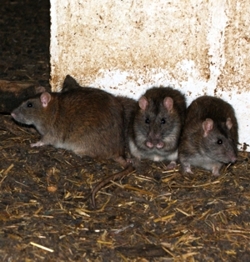The rats at the centre of an infestation in a Reading suburb are likely to have the Hampshire/Berkshire resistant gene (L120Q) and there is every chance that the rodent population in the Southcote district has been resistant to the second generation anticoagulants, difenacoum and bromadiolone for some time.
Dr Alan Buckle who chairs the Rodenticide Resistance Action Group (RRAG) commented: “We already know there is a resistance cluster in Berkshire and it would be no surprise if this included Reading. Presently, Reading University is working with Reading Borough Council, using the new DNA resistance detection technology, to try to understand what is going on within Reading’s rat population in relation to resistance.”
|
The story of how an 80 year old bed ridden stroke victim was allegedly bitten by rats in the Southcote district of Reading broke in July. Click here to read the BBC Berkshire report. The lady and her neighbours had to be evacuated as Reading Council was called in to try to deal with the problem. Neighbours said that the rat infestation in the Byefield Road, Brunel Road and Hatford Road area of Southcote had been a problem for a number of years but the situation came to a head on Friday, July 1, when the woman was believed to have been gnawed by rats as she lay in bed. Sadly she later died in hospital. The episode has generated outrage among local residents and, whilst the circumstances of the death of the woman in question are still under investigation, there is little wonder that the local MP has also become involved. Contractors are reported to have laid bait to control the problem but, if the rats are resistant, there is little chance of gaining control using difenacoum and bromadiolone. The products which will work against resistant strains are, of course, brodifacoum and flocoumafen, but neither can be used to control infestations such as this, in and around buildings, as their use is restricted ‘to indoor use only’. |
|
|
|
If these rats are indeed resistant this incident will add weight to the argument that the UK authorities should look to relax the ”indoor use only” stipulation for brodifacoum and flocoumafen, bringing the UK more in step with the rest of Europe. The UK regulation as it currently stands is effectively putting a much higher priority on the environment than on the health and well being of the public. RRAG has recently published guidelines for those faced with problems caused by resistant rats click here to download your copy.
|
||


